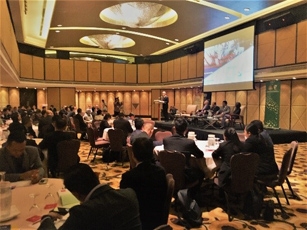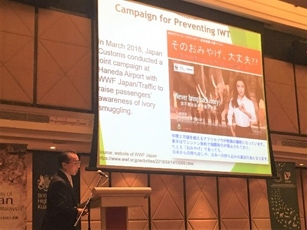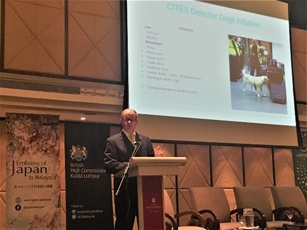Environment
Capacity-Building Workshop in relation to Illegal Wildlife Trade in Malaysia (Japan-UK Collaboration Project)
March 26, 2019
 Workshop
Workshop
 An overview by Japanese Expert
An overview by Japanese Expert
 An overview by UK Expert
An overview by UK Expert
Japan and the United Kingdom (UK) hosted a three-day capacity-building workshop in Malaysia from February 26, for the country's customs authorities, to aid their efforts in combatting illegal wildlife trade. The workshop was as follows:
- Target Audience: Customs officials, police officers, port authorities of Malaysia
(about 50) - Other Attendants: Deputy Minister of the Ministry of Water, Land and Natural Resources (KATS) of Malaysia, the Department of Wildlife and National Parks Peninsular Malaysia, Officials from the Embassies of Japan and the UK in Malaysia, Non-governmental organizations such as TRAFFIC and the World Wildlife Fund (WWF) , and private companies such as DHL.
- The Workshop
- A Japanese expert gave an overview of Japan's strict prosecution of illegal wildlife trade and detection at the borders to date, providing specific case studies with data on numbers of seizures and types of wildlife involved, making reference to large-scale seizures of ivory that arrived from Malaysia in 2006.
- Experts from the UK's Border Force provided an overview of current realities of illegal wildlife trade in the world, and cited cases, involving the transport and logistic sectors, that had led to large-scale seizures of products banned under CITES (the Convention on International Trade in Endangered Species) at UK ports and airports.
- Deliverables: Through the organization of this workshop, Japan has been able to make progress on one of its commitments to action on illegal wildlife trade announced at the London Conference on the Illegal Wildlife Trade (October, 2018).
The Government of Japan will continue working with international partners to combat international crimes, such as illegal wildlife trade. To ensure that the survival of elephants in the wild is no longer threatened, Japan will continue to promote anti-poaching measures and implement tight controls on domestic ivory transactions, which are on par with other major countries.

